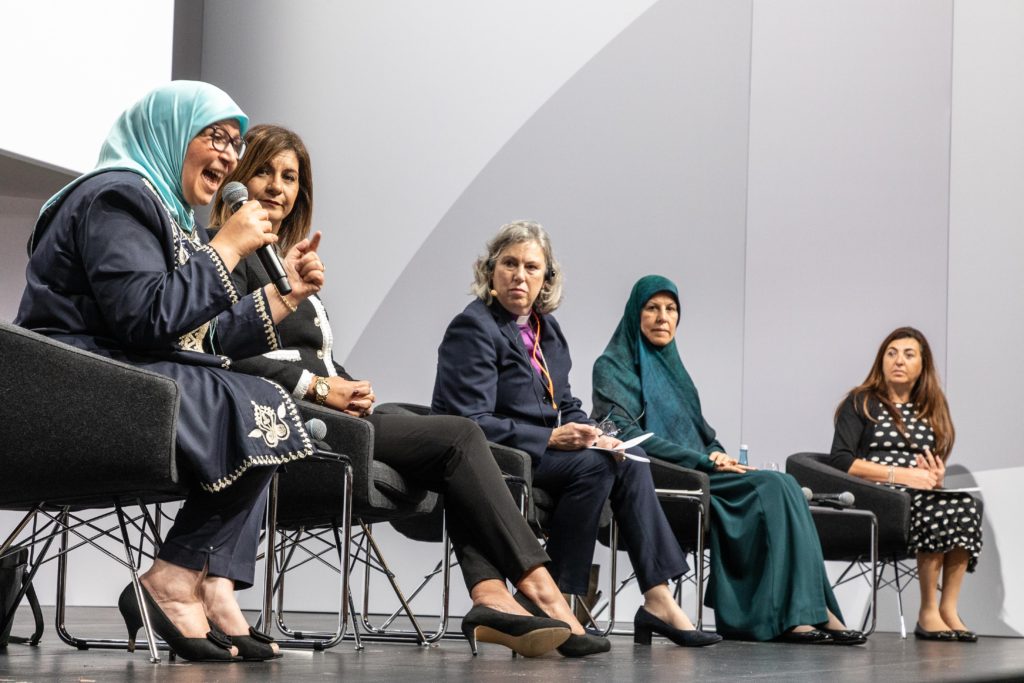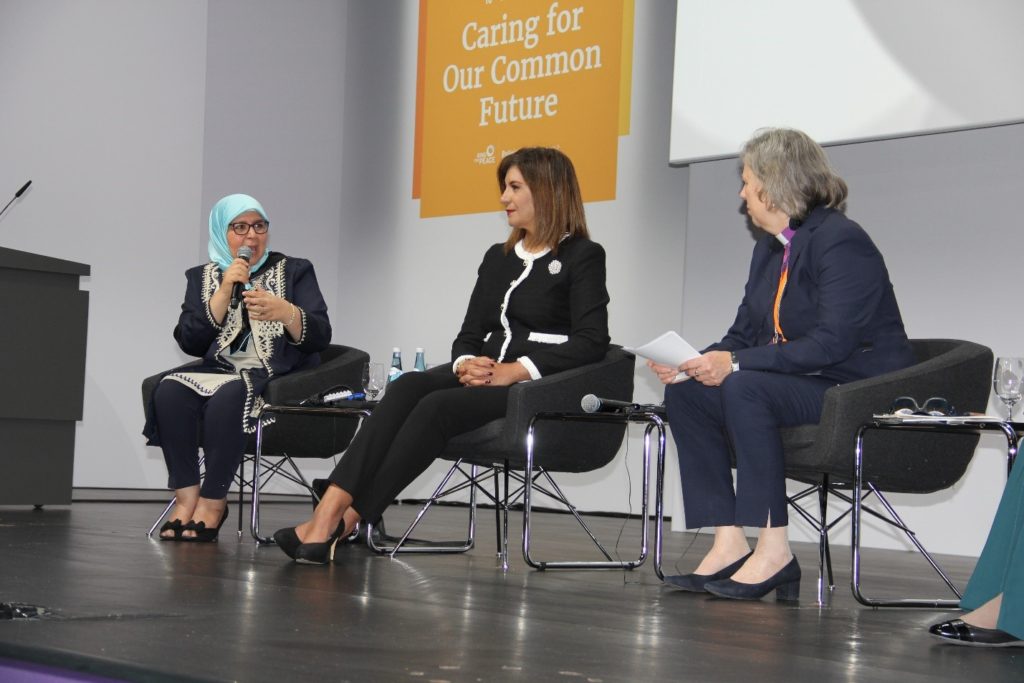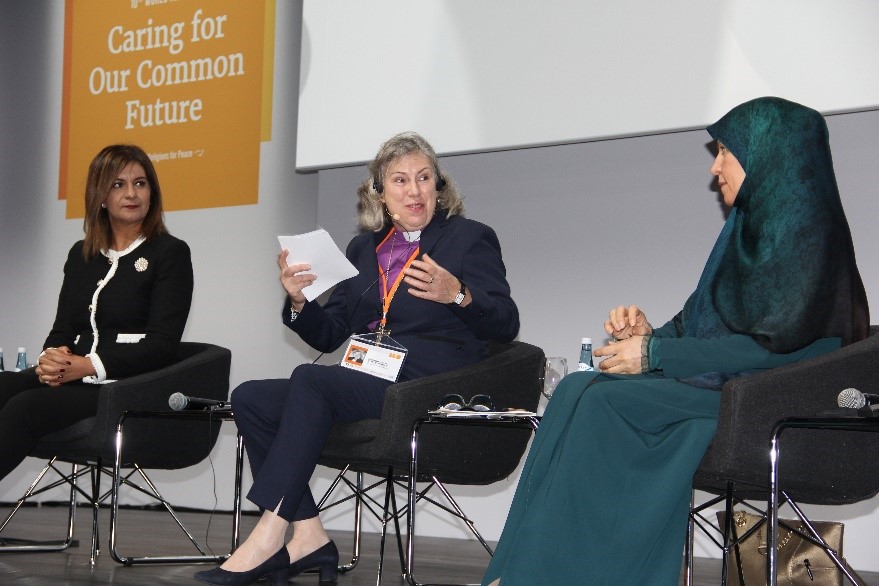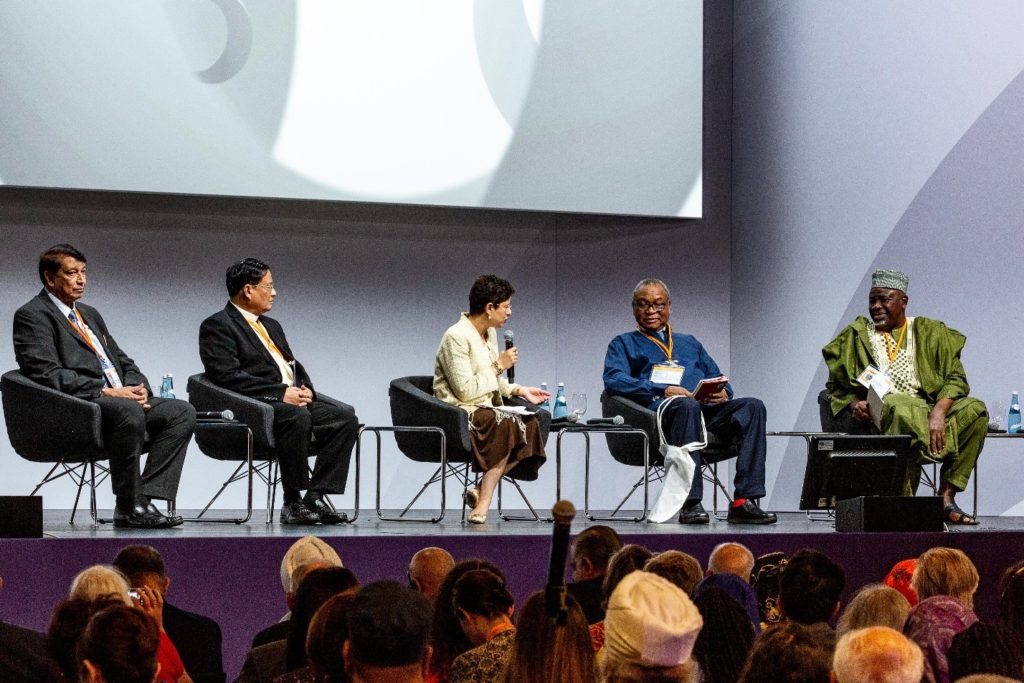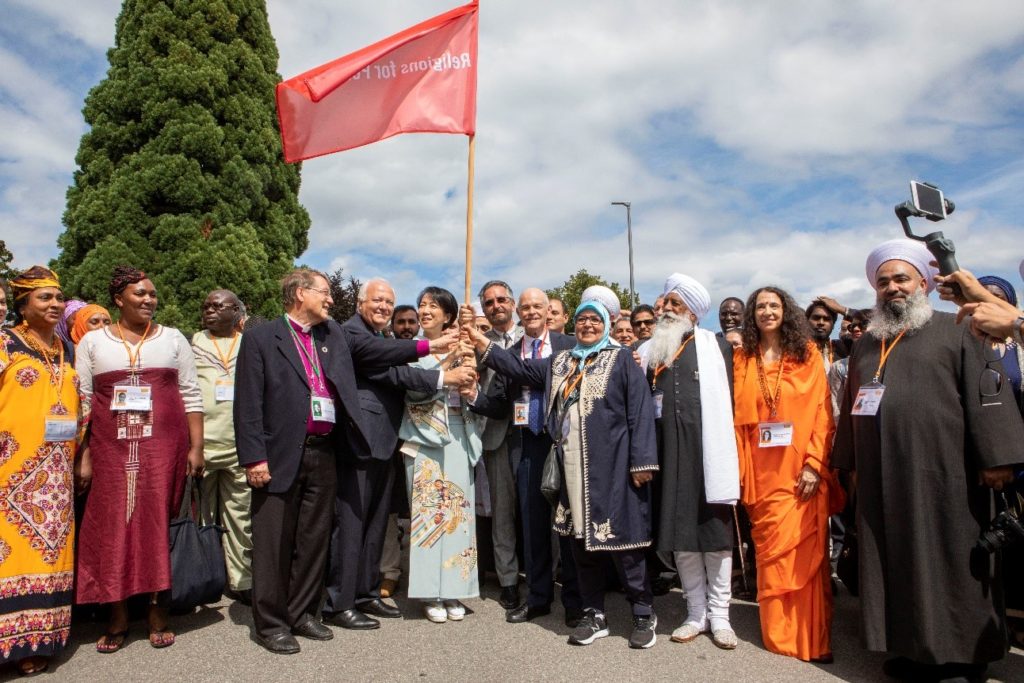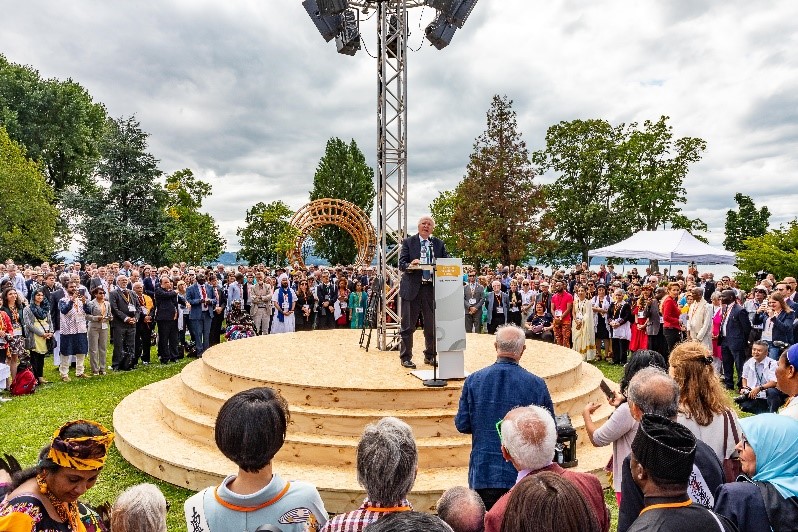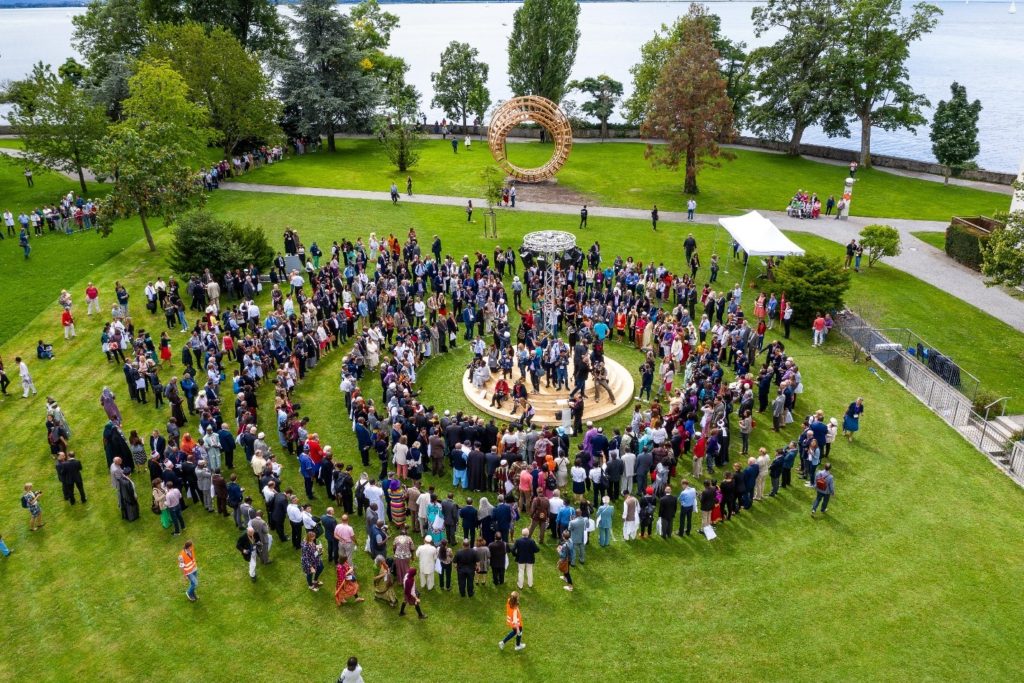Tapping into the Potential of Women of Faith as Peacemakers | Multi-Religious Leaders Unify to Safeguard Holy Sites
20190821FOR IMMEDIATE RELEASE
(Lindau, Germany) Religions for Peace hosted a historic special session “MENA Women as Peacemakers” to highlight the crucial and irreplaceable role of women as agents of change and peace across the globe, with a specific focus on the Middle East and North Africa (MENA) region. With religious identity becoming a de facto fault line for both intra-national and cross-border hostilities, this new coalition brought together women of faith leaders from Sunni, Shia, Christian, Jewish and other traditions to serve as a high-level multi-religious mechanism for advocacy and action to resolve conflict, advance sustainable development and protect the environment in the region and internationally. The same cohort travelled to Amman, Jordan earlier this month symbolic common action before its official launch at the RfP 10th World Assembly. The delegation met with Syrian refugees and members of the host communities in the city of Zarqa to show their solidarity and support and their multi-religious commitment to action for the common good.
The Conversationalists included Honorable Meherzia Labidi Maïza (Sunni) [First Vice President of the Constitutional Assembly in Tunisia; Honorary President, RfP]; Honorable Layla Al-Khafaji (Shia) [Elected Member of Political Bureau, Alhikmha Movement; former member of Iraqi Council of Representatives, Parliament; Member of RfP International Women’s Coordinating Committee]; H.E. Ambassador Houda Ezra Nonoo (Jewish)[Former Bahrain Ambassador to the United States], and H.E. Minister Nabila Makram (Christian) [Representative, Middle East Council of Churches].
Hon. Labidi Maïza discussed her twenty six year history working with RfP.
She said,
“Conflicts may be conflicts of ideas, so I learned how to build peace through legislation, peace through constitution, peace through the protection of minorities and citizenship, through democracy. From my experience with Religions for Peace, I learned, not only how to “Welcome the Other,” but how to understand their stories and to give them to human rights. Women are equipped for peacebuilding because they have the empathy to understand hardship and discrimination. They have the capacity to speak with others without taking away their voice.
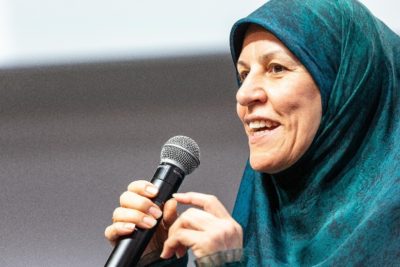 Ms. Layla Al-Khafaji discussed her experience under the regime of the Ba’ath party of Saddam Hussein where her family was labelled as anti-regime and targeted by violence. While attending engineering school, her brother was executed, and she was questioned every few days. She was imprisoned for eleven years and watched twenty five women imprisoned with her face execution. The Ba’ath party released her to appease rebels in 1991.
Ms. Layla Al-Khafaji discussed her experience under the regime of the Ba’ath party of Saddam Hussein where her family was labelled as anti-regime and targeted by violence. While attending engineering school, her brother was executed, and she was questioned every few days. She was imprisoned for eleven years and watched twenty five women imprisoned with her face execution. The Ba’ath party released her to appease rebels in 1991.
Ms. Layla Al-Khafaji escaped to Canada and continued her advocacy of human rights and the exposure of the cruelty of the dictatorship of Saddam Hussein. She returned to Iraq and was elected to the first parliament in 2006, pulled by her moral imperative to elevate the voices of the women imprisoned with her who faced execution. She said, “Our suffering in this world will not stop. But through this suffering, we can have our voices heard.”
RfP recognizes that MENA women of faith have the unique potential to build confidence and advance peace across the region.
The Special Session was conducted so that Assembly delegates could witness the women holding an intimate conversation – exchanging ideas, thoughts and experiences – organically building upon one another. The moderator, Rt. Rev. Bishop Petra Bosse-Huber [Bishop for Ecumenical Relations and Ministries abroad, Evangelical Church in Germany; Co-Moderator, RfP] moved the conversation to ensure a six-way conversation. Bishop Bosse-Huber included the Assembly participants by opening to their comments and questions.
Following the historic special session, Assembly delegates learned more about RfP’s tested method and approach of transforming violent conflict in both Myanmar and Nigeria. In Myanmar, RfP has developed a multi-level, multi-stakeholder approach to supporting efforts to end violent conflict, including decades-long conflicts between the military and armed ethnic groups. At the diplomatic level, a high-level multi-religious delegation was invited to visit the country and deliver the “Letter to the Peoples of Myanmar” carrying a call for the establishment of the Religions for Peace Advisory Forum on National Reconciliation and Peace in Myanmar. To respond to the critical lack of “open space” for dialogue and cooperation among all stakeholders, this program builds a unique multi-religious and multi-stakeholder mechanism for dialogue and action. The government has publicly acknowledged the critical role religious leaders play in transforming conflict and pledged to support RfP work on dialogue and multi-religious cooperation. Following these efforts to establish peace and reconciliation in Myanmar, Religions for Peace-Myanmar (RfP-M) has been recognized as “the most high-profile and visible international specialist interfaith actor” working in the context.
H.E. John Cardinal Onaiyekan [Archbishop of Abuja, Nigeria; Co-Moderator of RfP] and H.M. Sultan Muhammad Sa’ad Abubakar III [Sultan of Sokoto; Co-President of RfP] discussed their work leading multi-religious action combatting violent extremism and promoting dialogue to reduce tension across ethnic and religious divides in Nigeria. Following their advocacy efforts to the government to promote dialogue over excessive use of force, an agreement was reached that led to the return of the remaining Chibok schoolgirls captured by Boko Haram.
The International Campaign to Abolish Nuclear Weapons (ICAN), a partner of Religions for Peace, presented the second “Action Point” in the Plenary Meeting calling for further educating, mobilizing and engaging religious leaders and communities on the catastrophic consequences of nuclear weapons, affirming support for the Treaty on the Prohibition of Nuclear Weapons for the total elimination of nuclear weapons, and calling on all governments to sign and ratify it as soon as possible. The Assembly adopted this call to action by acclamation. This is now the second “Action Point” adopted by Assembly delegates, indicating the full commitment delegates have to pursuing concrete, multi-religious action for peace.
Afterwards, the delegates and guests took part in a multi-religious possession and spiritual ceremony at the Ring for Peace, a 7.5-meter-high wooden sculpture that will be a permanent symbol of peace among religions. In his address at the Ring for Peace Ceremony, H.E. Miguel Ángel Moratinos [United Nations High Representative for the Alliance of Civilizations], emphasized that the global preservation and protection of religious sites is crucial to overcome targeted attacks that wound peaceful and fruitful cooperation among the world’s religious communities. With these words, he echoed the symbolism of the Ring for Peace and the message associated with it: the Ring for Peace is constructed of a wide variety of wood from all over the world, forming a wooden Moebius strip – a spiritually significant symbol of balance and union.
H.E. Moratinos stated:
“At UNAOC we firmly believe that enlightened religious leaders and scholars of all faiths have a key role to play. Their advocacy can influence political leaders and ordinary citizens alike. Their teaching and guidance can inspire people to new levels of responsibility, commitment and public service. And by their example, they can promote interfaith dialogue and bridge the chasms of ignorance and misunderstanding. Indeed, faith-actors have the capacity of social mobilization.”
In his closing remarks, Dr. William Vendley, [Secretary General, RfP] called for increased and continued partnership with the UNAOC and Ring for Peace.
On 22 March 2019, United Nations Secretary-General Mr. António Guterres tasked H.E. Mr. Miguel Moratinos to develop an Action Plan for the United Nations to be fully engaged in support of safeguarding religious sites. UNAOC and RfPhave partnered in the shared mission of reaching out to governments, faith-based organizations, religious leaders and others to explore actions to prevent attacks and guarantee the sanctity or religious sites. While RfP has been working to safeguard holy sites for over a decade, 2019 has reminded the entire human family of the urgent nature of this work. From Christchurch mosque in New Zealand to Wat Rattananupab temple in Thailand; from synagogues in the United Sates to churches in Sri Lanka, places of worship have faced devastating attacks in 2019. While such violence has harmed thousands of people, it also has created a powerful opportunity for change.
This timely initiative of UNAOC has been welcomed by religious leaders and communities, as it broadens and strengthens efforts across religious communities around the world to monitor and protect holy sites and to promote peace and reconciliation between people from diverse ethic and religious backgrounds.
In the afternoon, Assembly delegates will conclude their second of two Commission meetings. These meetings allow participants to delve deeply into the Assembly theme of their interest and apply their regional and religious perspective to the theme to further deepen understanding for all Assembly participants, and the larger RfP global network.
The Religions for Peace 10th World Assembly is in partnership with Ring for Peace and generously supported by the Federal Foreign Office of Germany and the Bavarian State Ministry.
